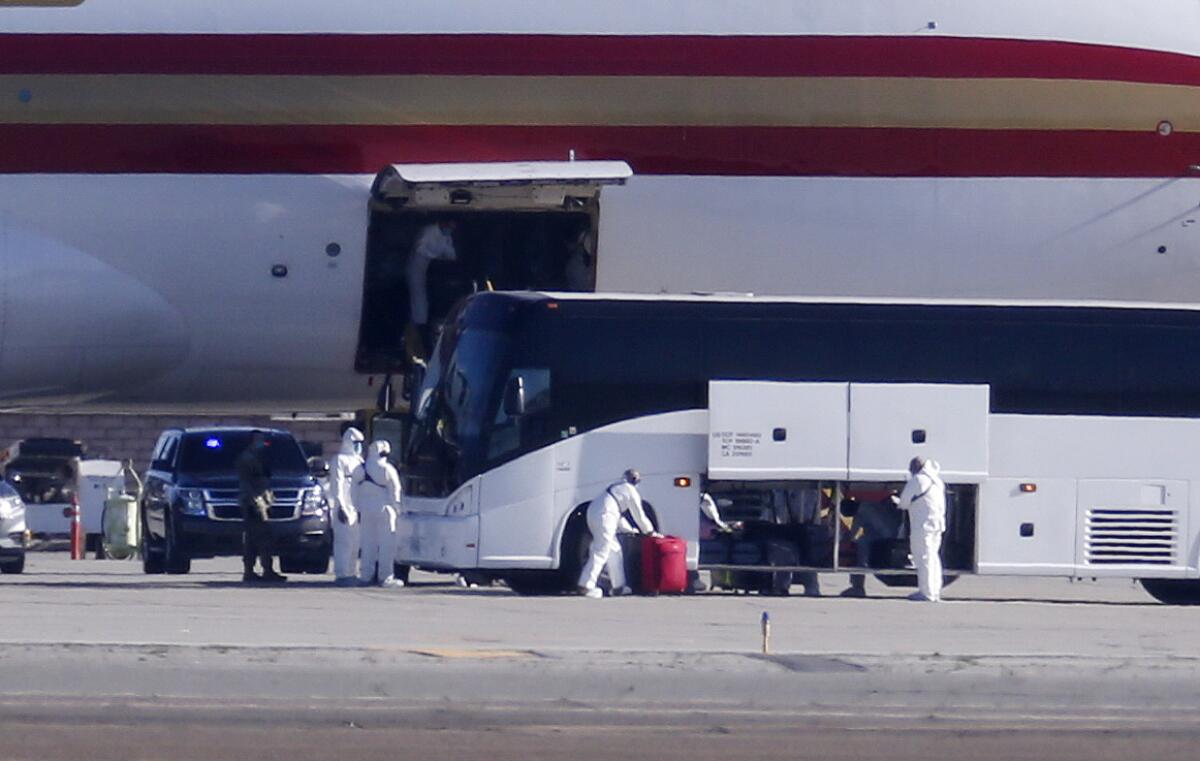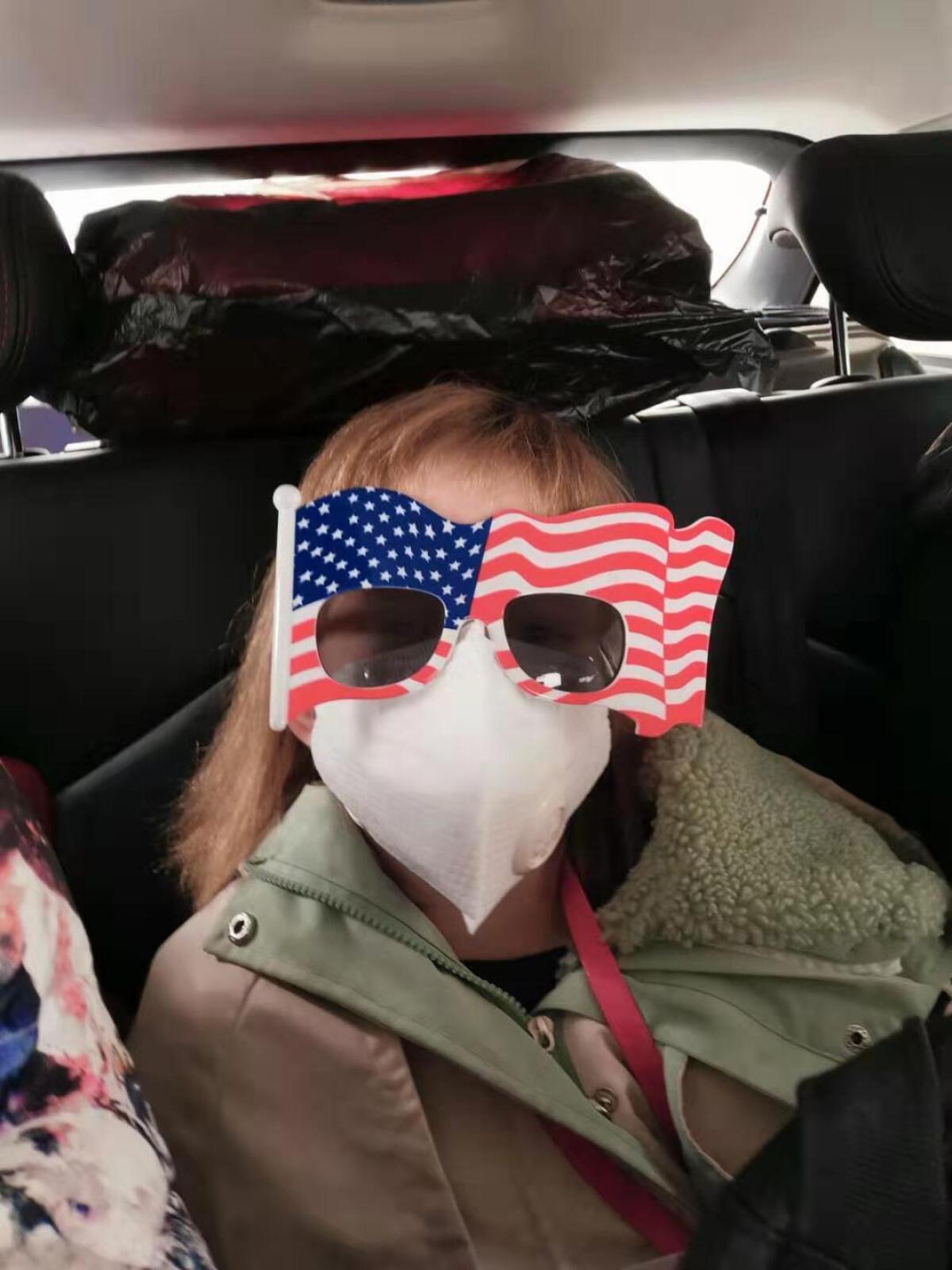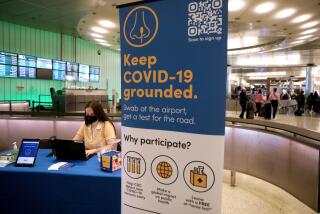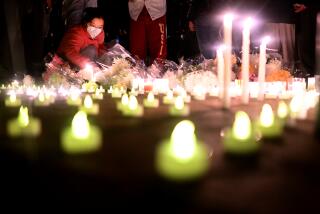Worry and confusion arise as Americans flee coronavirus in Chinese city

BEIJING — The plane was the only way out of the besieged Chinese city, and Americans clamored for seats.
A couple with a 7-year-old daughter did not receive the coveted call from officials offering them seats on the plane. A 65-year-old man’s phone rang, but he gave up his spot because others needed it more.
According to some Americans trying to escape, there seemed to be no rhyme or reason as to who was tapped by U.S. officials to board the flight early Wednesday, whisking them away from Wuhan, the center of a respiratory virus outbreak that has killed at least 170 people in the last two months. More than 7,600 people have been infected in China, surpassing the number of cases in the country during the 2002-03 SARS outbreak.
For a week, Wuhan has been under lockdown, with no transportation out of the city, as Chinese officials desperately try to keep the new coronavirus from spreading.
The inland city of 11 million, a university and business hub often called the Chicago of China, has become a cauldron of fear, stress and boredom, with overwhelmed hospitals, empty streets and isolated residents afraid to be in the same room with close friends.
It is unclear how deadly the virus is or how easily it spreads. Most reported cases have occurred in Wuhan and surrounding Hubei province, and most patients elsewhere had recently traveled there.
But the tally of fatalities and confirmed cases, as well as the virus’ geographic reach, has increased daily, prompting the U.S. State Department to recommend that Americans avoid traveling to China. Some airlines have begun restricting flights out of the entire country, not just Wuhan.
For U.S. expatriates in Wuhan, many of whom teach English at universities and language institutes, the crisis is especially disorienting.
Many are not fluent in Chinese and worry about communicating if they go to the hospital. They share anxieties and questions with one another on WeChat and Facebook forums. On Wednesday, one man posted that he lost his temper at a Walmart cashier who rummaged through a quilt he had just bought, potentially spreading germs.
Americans still stuck in Wuhan have received no word about any future government-sponsored flights. Some are angry at U.S. officials for not doing more to help.
A State Department representative said officials were working with Chinese authorities on options for U.S. citizens to depart Wuhan or other parts of China.
On the charter flight that landed Wednesday in California, priority was given to “vulnerable individuals” at higher risk from the coronavirus, including small children, older adults and people with health conditions, the representative said in a written statement. Family members of those individuals were also allowed on the flight, the statement said.
Secretary of State Michael R. Pompeo said Americans should know “there are enormous efforts underway by the United States government to make sure that we do everything we can to protect the American people and to reduce the risk all around the globe.”
Asked if the State Department was considering a ban on travel to China, Pompeo said he would not get ahead of any decisions or internal deliberations.
“The State Department constantly evaluates the risk” to travelers, Pompeo said to reporters Wednesday on a plane to London and Ukraine. “We’ve raised the level to Level 4 inside of Wuhan, and we will evaluate it on a continuous basis, literally hour by hour, whether that’s the appropriate level in Wuhan and whether we get it right in other places. That includes travel advisories, a wide range of things, including banning travel, all the things we constantly have under consideration.
“We want to make sure we get it right. At the same time, we don’t want to overreact either. We don’t want to react in a way that actually has the potential to make things worse and not better,” he said.
Jacob Wilson, a 33-year-old Louisiana native who runs a tech start-up in Wuhan, said he’s “anxious, to put it lightly.”
“There’s a mixture of fear and anger,” he said. “It’s not like I’m trying to drag the embassy through the mud, but people are dying in Wuhan and getting sick.”
In addition to consular officials being evacuated by the State Department, the plane from Wuhan had room for a number of others, for a total of 201 passengers. It stopped for refueling in Alaska before arriving at March Air Reserve Base in Riverside County. The passengers were isolated from the crew throughout the flight, officials said. According to officials, everyone aboard passed a health screening in Anchorage.
Officials from the U.S. Centers for Disease Control and Prevention sought to reassure Americans that passengers on the flight would not pose any danger. The Wuhan returnees were screened for symptoms of the virus before boarding, while in Alaska, during the flight and again at March air base, the CDC said in a news release. They will be held for three days at the air base and monitored by health officials.
A photograph from the base showed rows of cots apparently ready for people to undergo medical evaluations.
Wilson, the start-up owner, did not get a seat on the plane. But unlike many expatriates, he owns a car. He spread the word on social media that he was available for rides to the airport.
His first passenger was a young woman with special medical needs apart from the virus. They stopped to pick up another woman and her 8-year-old daughter.
The lockdown includes restrictions on private cars in Wuhan. Wilson hoped his license plate number had been logged with authorities as a car taking Americans to the airport.
The “Today” show broadcast a video of the girl in a surgical mask saying from the backseat of Wilson’s car: “We’re going to the U.S.”

Her mother, Priscilla Dickey, said, “Yeah, to see your Nanna and your Poppa.”
Wilson said he later returned to the airport to take the mother and daughter back home. The girl’s passport was with her father in another city, and she was not allowed to board the plane, said Wilson, who moderates a Wuhan American expat group on WeChat with about 180 members.
Some other children booked on the flight were also turned away because of issues with travel documents, Wilson said. He planned to make another run to the airport soon to get a British citizen out of the country.
Wilson broke down in tears as he described an elderly woman barred from entering a Walmart because an employee determined she had a fever. He worried that she would starve.
Christopher Suzanne is one of the lucky Americans who escaped Wuhan. He had already booked a Jan. 22 flight for his infant son to be baptized in Albany, N.Y.
In the weeks before the trip, the baby was hospitalized in Wuhan for a serious illness that included fever and respiratory problems. When Suzanne asked if his son had the coronavirus, the doctor pretended she did not speak English, he said.
The boy recovered, and the family left on one of the last flights out of the city.
“I feel almost guilty that I’m not in Wuhan,” Suzanne said. “All my friends that I lived with and worked with, I’m watching them panic.”
John McGory, 65, said he gave up his seat on the government flight because he could survive the siege better than families with children. He suspects he was offered a place because he had been interviewed by U.S. media outlets.
McGory moved to Wuhan six years ago to teach English and experience life in another country. He was just about to return home to Ohio and was busy with goodbye dinners and packing when the city went on lockdown.
Now he does not know when he will leave. His university housing is free, and he hopes he has enough money for food for the long haul.
He takes daily walks on the deserted campus, blogs about the experience and is adding a chapter about the quarantine to a book he is writing, after recently publishing a book about learning English as a second language.
With widespread paranoia in Wuhan about face-to-face contact, McGory’s social life is mostly limited to social media. People have been sharing videos of pastimes, including a man attempting to hook a fish from an indoor fish tank and women playing mah-jongg with plastic bags covering their entire faces.
When McGory invited a friend over for a drink, joking that scotch kills all germs, the friend’s wife nixed the plan.
He plans to get some charcoal from Walmart and have a cookout, with guests wearing surgical masks and keeping a safe distance from one another. But he fears no one will show up.
“They’ll probably hide in their rooms and think the worst thoughts,” McGory said. “You can’t live like that forever.”
Times staff writer Tracy Wilkinson in Washington and the Associated Press contributed to this report.
More to Read
Sign up for Essential California
The most important California stories and recommendations in your inbox every morning.
You may occasionally receive promotional content from the Los Angeles Times.











